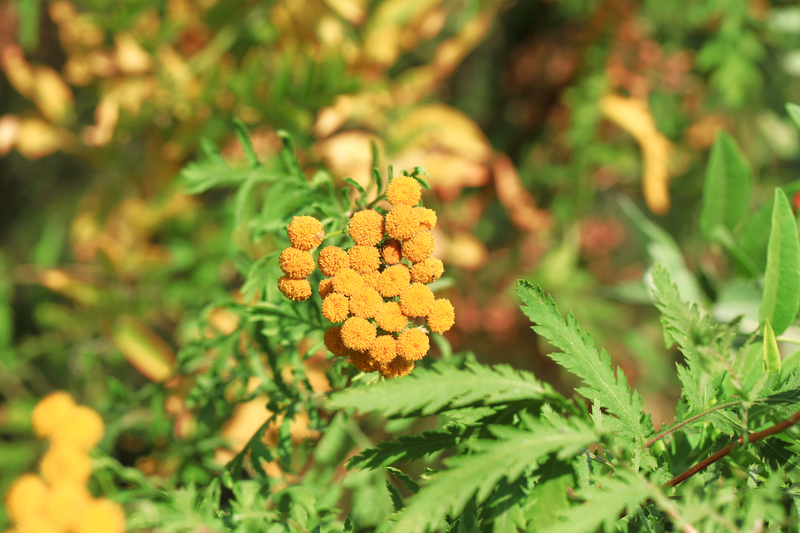Boost Your Garden's Vitality with 3 Powerful Weed Control Strategies
Posted on 09/06/2025
Boost Your Garden's Vitality with 3 Powerful Weed Control Strategies
Keeping your garden flourishing requires more than just watering and fertilizing--it's a constant battle against invasive weeds. These unwelcome guests threaten to rob your garden of essential nutrients, sunlight, and space. Fortunately, with the right weed management techniques, you can ensure your plants thrive. In this comprehensive guide, discover how to boost your garden's vitality with three powerful weed control strategies that are both effective and environmentally friendly.
Why is Weed Control Essential for a Healthy Garden?
Weeds are more than just unsightly--these aggressive plants compete with your prized flowers, vegetables, and shrubs for vital resources. Left unchecked, they can:
- Reduce crop yields by siphoning off nutrients and water
- Harbor pests and plant diseases
- Hinder seed germination and plant growth
- Cause unsightly overgrowth and diminish landscape appeal

Understanding Weeds: Know Your Enemy
Before diving into effective garden weed control methods, it's important to understand the types of weeds you may encounter:
- Annual Weeds: Complete their life cycle in a single season (e.g., crabgrass, chickweed).
- Perennial Weeds: Persist for years, often resprouting from roots (e.g., dandelions, quackgrass).
- Biennial Weeds: Live for two years, flowering in the second (e.g., wild carrot, bull thistle).
Knowing which weeds are plaguing your garden will help you tailor your approach. Now, let's explore the top three weed prevention techniques to amplify your garden's vitality.
Three Proven Weed Control Strategies to Transform Your Garden
1. Mulching: Nature's Protective Blanket
One of the most trusted methods for controlling weeds is mulching. Not only does mulch suppress weed growth by blocking sunlight, it also improves soil structure, retains moisture, and adds aesthetic appeal. Here's how you can make the most of this natural weed barrier:
- Organic Mulch: Use materials like wood chips, shredded bark, straw, grass clippings, or compost. Spread a 2-4 inch layer around your plants, trees, and shrubs. Organic mulch breaks down over time, enriching the soil and further benefiting your plants.
- Inorganic Mulch: Materials such as landscape fabric, black plastic, river rock, or gravel are durable and excellent for garden paths or ornamental beds. They last longer but won't add nutrients to your soil.
Tip: Always lay mulch over weed-free soil. Avoid piling mulch directly against plant stems, as this can invite pests and disease.
Benefits of Mulching as a Weed Control Technique:
- Reduces weed seed germination by blocking sunlight
- Retains soil moisture for healthier plants
- Regulates soil temperature
- Enhances garden appearance
- Improves soil fertility (with organic mulch)
By consistently replenishing mulch, you'll maintain a strong defense that keeps weeds in check and nurtures your garden's vitality.
2. Hand Weeding and Hoeing: Precision Weed Removal
While it might sound old-fashioned, hand weeding remains one of the most effective and mindful weed control strategies. Hand-pulling enables you to target weeds precisely, minimizing damage to your prized plants.
- When to Weed: Weed early and often, especially after rainfall when the ground is moist and roots pull out easily.
- Use the Right Tools: Equip yourself with a sturdy weeding fork, hoe, or hand trowel to extract both the weeds and their root systems. This is crucial for perennial weeds that can regrow from tiny root fragments.
- Be Thorough: Remove as much of the root as possible. Even small leftover pieces can regrow, especially for stubborn weeds like dandelions and bindweed.
Advantages of Manual Weed Removal:
- Prevents weeds from seeding and spreading
- Immediate results without chemicals
- Improves soil aeration and loosening
- Safe for use around edible plants and children
Bonus Tip: Make hand weeding a relaxing part of your gardening routine. Regular, small sessions are less overwhelming than infrequent, marathon weed-pulling days!
3. Smart Planting & Ground Covers: Outcompete the Weeds
A well-planned garden layout is a natural line of defense against weeds. By strategically planting dense ground covers or using living mulches, you can outcompete invasive weeds and prevent them from getting established.
- Plant Closer Together: Closing gaps between plants shades the soil, making it harder for weed seeds to germinate and grow.
- Choose Aggressive Ground Covers: Fast-spreading species like creeping thyme, sweet woodruff, periwinkle, or clover can smother weeds in open areas.
- Rotate Crops: In vegetable gardens, rotating plant families each year disrupts weed life cycles, limiting their ability to adapt and proliferate.
- Intersperse with Annual Flowers: Quick-growing annuals fill temporary spaces, reducing opportunities for weeds to take root.
Key Benefits of This Weed Suppression Strategy:
- Creates a living barrier that chokes out unwanted plants
- Encourages biodiversity for healthier soil
- Adds visual interest and pollinator value
- Reduces maintenance needs over time
Pro Tip: Remember to select ground cover species that suit your climate and won't turn invasive themselves. A well-chosen plant community will promote lush, weed-free growth season after season.
Additional Weed Management Techniques for Ongoing Success
While the above key weed control strategies form the backbone of effective garden care, a few extra steps can maximize results:
- Maintain Edges: Keep lawn edges trimmed and install physical barriers to prevent grass and invasive plants from creeping into your garden beds.
- Water Carefully: Use targeted drip irrigation or soaker hoses to hydrate your plants without nourishing weed seeds between rows.
- Minimize Soil Disturbance: Tilling can bring buried weed seeds to the surface. Disturb the soil only when necessary, and mulch exposed spots promptly.
- Inspect New Plants: Always check that new additions to your garden--plants, soil, or compost--are weed-free before planting.
The Role of Organic and Chemical Weed Control Options
Some gardeners may consider organic weed control solutions such as vinegar, boiling water, or flame weeders. Use these carefully in targeted areas, as they can harm both weeds and garden plants on contact.
Chemical herbicides can be a last resort for severe infestations but should be applied with caution, following manufacturer instructions to avoid environmental harm. When possible, prioritize eco-friendly weed suppression methods to preserve beneficial insects, healthy soil, and safe produce.

Frequently Asked Questions About Weed Control in Gardens
- How often should I weed my garden?
Weed at least once a week during the growing season, or as soon as you spot new growth. Catching weeds early makes removal easier and prevents them from seeding. - Is landscape fabric a good weed barrier?
Landscape fabric can be very effective under mulch or gravel in perennial beds and walkways, but avoid using it near root crops or where you may want to transplant frequently. - Are all weeds harmful?
Some wild plants, like clover, can actually improve soil fertility and attract pollinators. Know which "weeds" may be beneficial to your garden before removing them indiscriminately. - When is the best time to mulch?
Apply mulch in early spring, before weed seeds germinate, and replenish as needed throughout the season to maintain thickness. - Can weeds be composted?
If composting, avoid adding weeds that have gone to seed or aggressive spreading types, unless your compost pile reaches high enough temperatures to kill seeds and roots.
Conclusion: Unleash Your Garden's Full Potential with Robust Weed Control
A vibrant, weed-free garden doesn't have to be a dream. By combining mulching, manual weeding, and strategic planting, you'll drastically reduce weed pressure and give your plants the head start they deserve. Remember that perseverance pays off--integrate these powerful weed management strategies into your garden care routine, and you'll cultivate a lush, productive landscape that turns heads and sustains your family year after year.
Start implementing these methods today, and witness firsthand how a disciplined approach to weed control can boost your garden's vitality for seasons to come!
Latest Posts
Engage and Educate with a Child-Friendly Yard
Curated Guide to Transformative Garden Seating Design
Steps to Crafting a Secure Play Area in Your Garden

